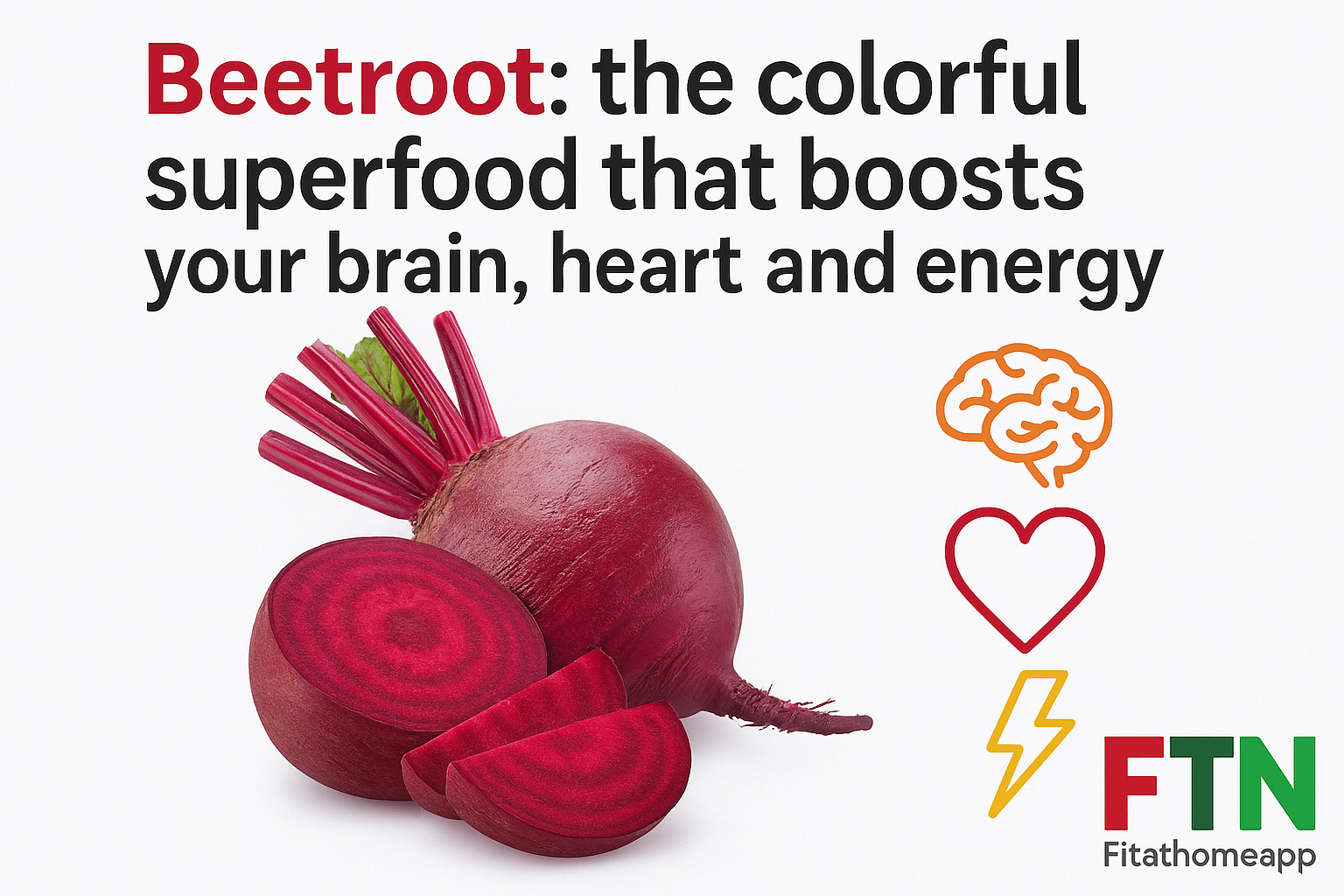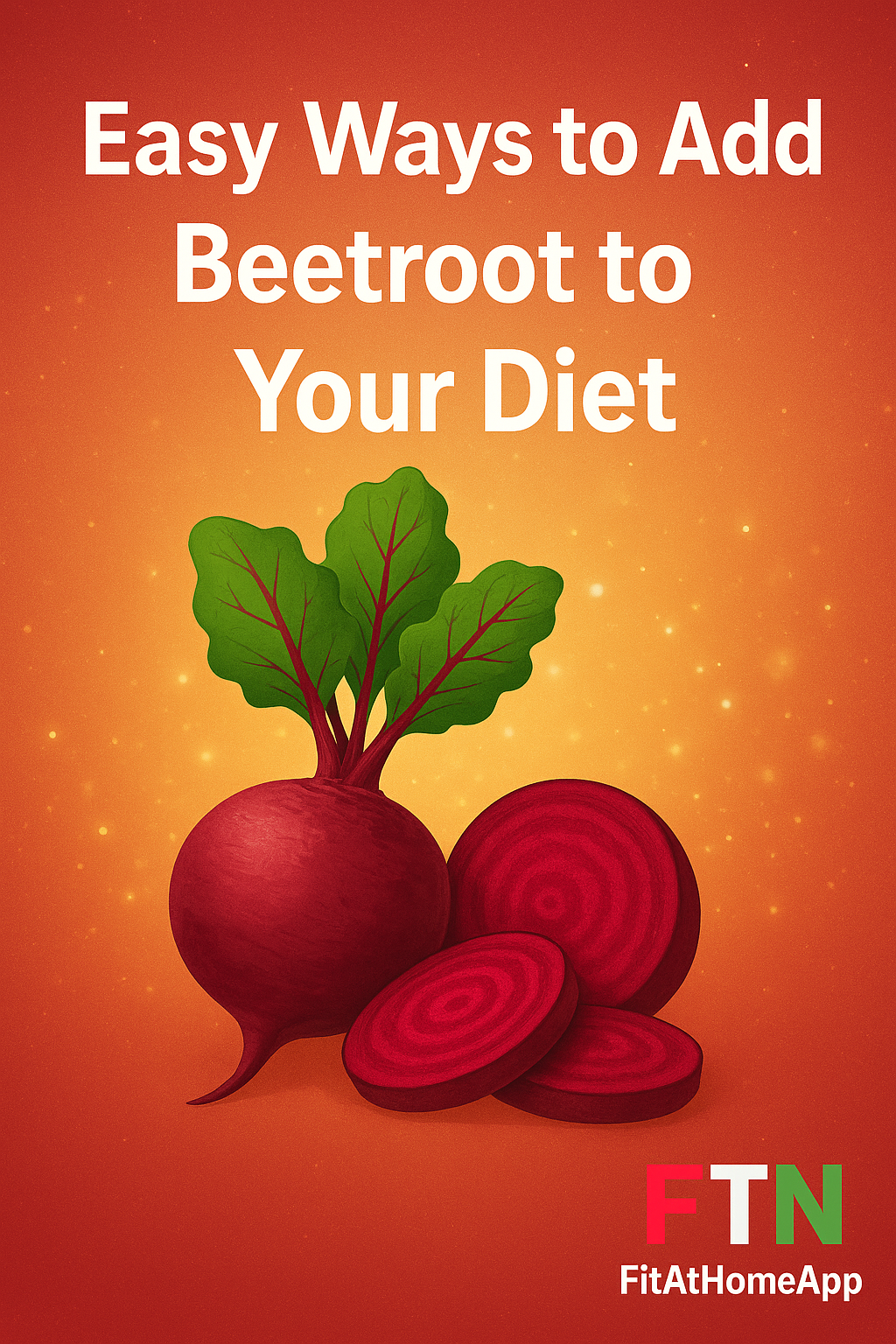✅ Introduction: Why Beetroot Deserves a Spot on Your Plate
Beetroot, also known simply as beet, is more than just a colorful addition to your salad—it’s a nutritional powerhouse celebrated for its impressive beetroot health benefits. With its rich crimson hue and naturally sweet taste, this root vegetable has become a staple in the world of superfoods for those seeking natural ways to support overall wellness.
Originally cultivated in the Mediterranean thousands of years ago, beetroot was valued not only for its flavor but also for its medicinal qualities. Today, as more people turn to whole, nutrient-dense foods for better health and energy, beetroot is making a strong comeback—showing up in juices, smoothies, salads, and even sports drinks.
What makes beetroot so special? It’s loaded with essential nutrients like folate, potassium, manganese, and vitamin C. It also contains powerful antioxidants called betalains, which give beets their vibrant color and contribute to a wide range of beetroot health benefits. Whether you’re looking to boost brain power, support heart function, or enhance physical performance, beetroot delivers on all fronts.
Brain Boost: How Beetroot Supports Mental Clarity and Focus
Did you know that eating beetroot can actually help improve your brain function? It all comes down to one key nutrient—nitrates. When you eat beets, your body converts these natural nitrates into nitric oxide, a molecule that helps relax and widen blood vessels. The result? Better blood flow to the brain.
This improved circulation plays a major role in supporting memory, focus, and overall cognitive performance. Some studies have even shown that older adults who consume beetroot juice before tasks involving memory and decision-making perform better than those who don’t.
But the benefits go beyond just improved circulation. Beets are also packed with antioxidants that protect your brain from oxidative stress, which is a known factor in cognitive decline. Regular consumption may help reduce the risk of age-related issues like dementia and Alzheimer’s disease. In short, adding beetroot to your diet is a smart move for your brain health—no pun intended.
Heart Health Hero: Why Your Cardiovascular System Loves Beetroot
Heart disease is still the leading cause of death in the United States—but your diet can make a big difference. Fortunately, beetroot is one of those foods that truly supports heart health.
As mentioned earlier, beets are rich in natural nitrates, which help lower blood pressure by improving blood flow and reducing resistance in the arteries. Multiple clinical trials have shown that drinking beetroot juice daily can lead to measurable drops in both systolic and diastolic blood pressure.
But that’s not all. Beetroot also contains potassium, which helps regulate heartbeat and prevent high blood pressure, and fiber, which supports healthy cholesterol levels. Together, these nutrients make beets a powerful ally in keeping your heart strong and your arteries clear.
And let’s not forget the antioxidants. The betalains in beetroot help reduce inflammation in the blood vessels and protect against oxidative damage—a key contributor to atherosclerosis (hardening of the arteries). It’s no wonder beetroot is often recommended as part of a heart-healthy diet.
Natural Energy: How Beetroot Enhances Physical Performance
Looking for a natural way to boost your energy before a workout or a long day? Beetroot might be just what you need. Athletes and fitness enthusiasts around the world are turning to beetroot juice to enhance their endurance and stamina—and the science backs them up.
Thanks to the nitric oxide produced from beet nitrates, muscles receive more oxygen during physical activity. This can lead to increased stamina, reduced fatigue, and improved exercise performance. One study even found that cyclists who consumed beetroot juice before riding were able to ride 15% longer than those who didn’t.
And it’s not just for elite athletes—everyday gym-goers, runners, and even older adults can benefit from the energizing properties of beets. Whether you’re tackling a workout, hiking, or just staying active, beetroot can help fuel your body more efficiently.
You can enjoy it as a pre-workout juice, blend it into a smoothie, or roast it with other veggies for a delicious energy-boosting meal. It’s a natural, clean way to keep your body moving.
Other Impressive Health Benefits of Beetroot
Beyond brain, heart, and energy, beetroot offers several other wellness perks:
Supports liver function: The betaine in beets helps detoxify the liver and aids in processing fats.
Promotes healthy digestion: With a good amount of dietary fiber, beets help keep your digestive system running smoothly.
Boosts immunity: Thanks to vitamin C and antioxidants, beetroot strengthens the immune system and helps the body fight off infections.
May help fight inflammation: Chronic inflammation is linked to diseases like arthritis and diabetes, and the betalains in beets have anti-inflammatory effects.
With all these benefits packed into a single root, it’s easy to see why beetroot has earned its superfood status.
One of the best things about beetroot is how easy it is to add to your meals. Here are a few delicious and simple ideas:
Beetroot juice: Drink it straight or mix with apple, carrot, or lemon juice for a refreshing and energizing beverage.
Roasted beets: Toss in olive oil, salt, and pepper, and roast until tender. Perfect as a side dish or salad topping.
Beet salad: Combine sliced beets with arugula, goat cheese, walnuts, and balsamic dressing.
Smoothies: Add raw or cooked beets to your morning smoothie for a natural energy boost and a pop of color.
Beet hummus: Blend beets with chickpeas, tahini, lemon, and garlic for a vibrant twist on a classic dip.
Beet chips: Slice thin and bake for a crunchy, healthy snack alternative to potato chips.
From drinks to desserts, beetroot is incredibly versatile—and delicious.
Final Thoughts: Why Beetroot Belongs in Your Kitchen
Beetroot isn’t just a pretty face—it’s one of the most nutrient-dense, health-supportive vegetables you can add to your diet. Whether you’re aiming to support brain function, strengthen your heart, or fuel your workouts naturally, beetroot delivers results backed by science and centuries of traditional use.
In a world where processed foods dominate grocery store shelves, choosing whole, natural ingredients like beetroot is a powerful step toward better health. It’s easy to prepare, tastes great, and works well in everything from salads to smoothies.
So next time you’re at the market, don’t pass up those beautiful purple roots. They might just be the health upgrade your diet has been missing.
My Personal Take on the Video
This video from BBC REEL, “Can beetroot boost our performance?”, does a stellar job explaining how beetroot enhances athletic performance. It breaks down how beet-derived nitrates convert into nitric oxide to improve blood flow and oxygen delivery to muscles
Improved Athletic Performance Beet nitrates convert to nitric oxide, enhancing blood flow and endurance. Drinking ~16 oz beet juice 90 minutes before exercise yields benefits.
Lower Blood Pressure & Heart Support Beetroot juice improves circulation, lowers blood pressure, and supports heart health through improved vascular function.
Enhanced Cognitive Function Better cerebral blood flow from nitrates may support brain performance and memory.
Detox & Anti-Inflammation Rich in betalains and antioxidants, beetroot helps reduce inflammation, supports liver detox, and protects cells from oxidative damage.
Whole Beets vs. Juice Whole beets provide fiber and slower energy release; juice delivers fast-acting nitrates—both have unique benefits depending on your health or performance goals.
🥕 Beetroot vs. Carrot: Which Root Vegetable Reigns Supreme?
Beetroot and carrot are both vibrant, nutrient-packed root vegetables, but they offer distinct health benefits and nutritional profiles. Whether you’re juicing, roasting, or snacking raw, here’s how these two superfoods stack up.
🧬 Nutritional Comparison
| Feature | Beetroot | Carrot |
|---|---|---|
| Color | Deep red / purple | Bright orange (also purple, yellow, red varieties) |
| Taste | Earthy, mildly sweet | Sweet, crisp, slightly grassy |
| Calories (100g) | ~43 kcal | ~41 kcal |
| Natural Sugars | Slightly higher | Lower sugar content |
| Key Vitamins | Folate, Vitamin C, Vitamin B6 | Vitamin A (beta-carotene), K1, B6, Biotin |
| Minerals | Potassium, Iron, Manganese | Potassium, Calcium, Magnesium |
❤️ Health Benefits Breakdown
🥬 Beetroot Health Benefits:
- Rich in natural nitrates → Improves blood flow and lowers blood pressure
- Boosts athletic performance and stamina
- Supports brain health by increasing oxygen delivery
- Contains betalains, which reduce inflammation and oxidative stress
- Supports liver detoxification with betaine
🥕 Carrot Health Benefits:
- High in beta-carotene → Converts to Vitamin A for eye health
- Promotes immune system function
- Great for skin and hair health
- Aids in digestion with fiber
- Helps regulate blood sugar with low glycemic index
🍽️ How They’re Used
| Category | Beetroot | Carrot |
|---|---|---|
| Raw | Salads, juices, smoothies, beet hummus | Salads, snacks, juices, slaws |
| Cooked | Roasted, steamed, in soups or veggie burgers | Roasted, steamed, soups, stir-fries, even in carrot cake |
| Flavor impact | Adds deep color and earthy sweetness | Adds sweetness and crunch |
🧠 When to Choose Each?
- Choose Beetroot if you want to:
✅ Improve circulation and heart health
✅ Boost physical endurance
✅ Detox your liver
✅ Add rich color and earthy flavor to your meals - Choose Carrot if you want to:
✅ Support vision and immune health
✅ Reduce blood sugar naturally
✅ Snack low-calorie and crunchy
✅ Add sweetness to savory and sweet dishes
✅ Final Thoughts: A Power Combo
Both beetroot and carrot are low-calorie, high-fiber, and loaded with antioxidants. While beetroot shines in blood flow, stamina, and detox, carrot excels in eye health, immunity, and sweetness.


